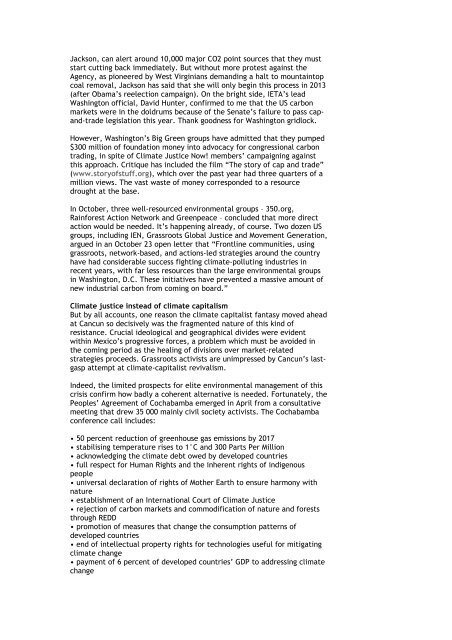April 2011 - Centre for Civil Society - University of KwaZulu-Natal
April 2011 - Centre for Civil Society - University of KwaZulu-Natal
April 2011 - Centre for Civil Society - University of KwaZulu-Natal
Create successful ePaper yourself
Turn your PDF publications into a flip-book with our unique Google optimized e-Paper software.
Jackson, can alert around 10,000 major CO2 point sources that they must<br />
start cutting back immediately. But without more protest against the<br />
Agency, as pioneered by West Virginians demanding a halt to mountaintop<br />
coal removal, Jackson has said that she will only begin this process in 2013<br />
(after Obama’s reelection campaign). On the bright side, IETA’s lead<br />
Washington <strong>of</strong>ficial, David Hunter, confirmed to me that the US carbon<br />
markets were in the doldrums because <strong>of</strong> the Senate’s failure to pass capand-trade<br />
legislation this year. Thank goodness <strong>for</strong> Washington gridlock.<br />
However, Washington’s Big Green groups have admitted that they pumped<br />
$300 million <strong>of</strong> foundation money into advocacy <strong>for</strong> congressional carbon<br />
trading, in spite <strong>of</strong> Climate Justice Now! members’ campaigning against<br />
this approach. Critique has included the film “The story <strong>of</strong> cap and trade”<br />
(www.story<strong>of</strong>stuff.org), which over the past year had three quarters <strong>of</strong> a<br />
million views. The vast waste <strong>of</strong> money corresponded to a resource<br />
drought at the base.<br />
In October, three well-resourced environmental groups – 350.org,<br />
Rain<strong>for</strong>est Action Network and Greenpeace – concluded that more direct<br />
action would be needed. It’s happening already, <strong>of</strong> course. Two dozen US<br />
groups, including IEN, Grassroots Global Justice and Movement Generation,<br />
argued in an October 23 open letter that “Frontline communities, using<br />
grassroots, network-based, and actions-led strategies around the country<br />
have had considerable success fighting climate-polluting industries in<br />
recent years, with far less resources than the large environmental groups<br />
in Washington, D.C. These initiatives have prevented a massive amount <strong>of</strong><br />
new industrial carbon from coming on board.”<br />
Climate justice instead <strong>of</strong> climate capitalism<br />
But by all accounts, one reason the climate capitalist fantasy moved ahead<br />
at Cancun so decisively was the fragmented nature <strong>of</strong> this kind <strong>of</strong><br />
resistance. Crucial ideological and geographical divides were evident<br />
within Mexico’s progressive <strong>for</strong>ces, a problem which must be avoided in<br />
the coming period as the healing <strong>of</strong> divisions over market-related<br />
strategies proceeds. Grassroots activists are unimpressed by Cancun’s lastgasp<br />
attempt at climate-capitalist revivalism.<br />
Indeed, the limited prospects <strong>for</strong> elite environmental management <strong>of</strong> this<br />
crisis confirm how badly a coherent alternative is needed. Fortunately, the<br />
Peoples’ Agreement <strong>of</strong> Cochabamba emerged in <strong>April</strong> from a consultative<br />
meeting that drew 35 000 mainly civil society activists. The Cochabamba<br />
conference call includes:<br />
• 50 percent reduction <strong>of</strong> greenhouse gas emissions by 2017<br />
• stabilising temperature rises to 1°C and 300 Parts Per Million<br />
• acknowledging the climate debt owed by developed countries<br />
• full respect <strong>for</strong> Human Rights and the inherent rights <strong>of</strong> indigenous<br />
people<br />
• universal declaration <strong>of</strong> rights <strong>of</strong> Mother Earth to ensure harmony with<br />
nature<br />
• establishment <strong>of</strong> an International Court <strong>of</strong> Climate Justice<br />
• rejection <strong>of</strong> carbon markets and commodification <strong>of</strong> nature and <strong>for</strong>ests<br />
through REDD<br />
• promotion <strong>of</strong> measures that change the consumption patterns <strong>of</strong><br />
developed countries<br />
• end <strong>of</strong> intellectual property rights <strong>for</strong> technologies useful <strong>for</strong> mitigating<br />
climate change<br />
• payment <strong>of</strong> 6 percent <strong>of</strong> developed countries’ GDP to addressing climate<br />
change
















